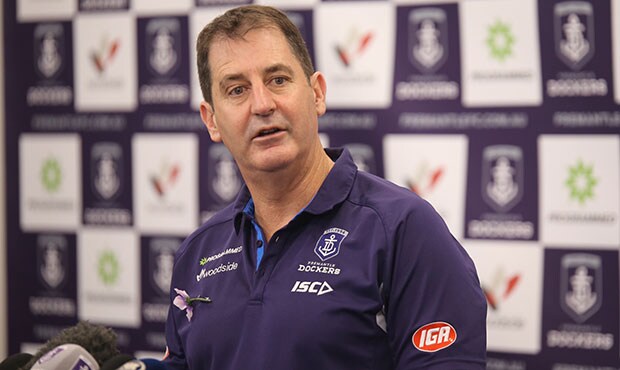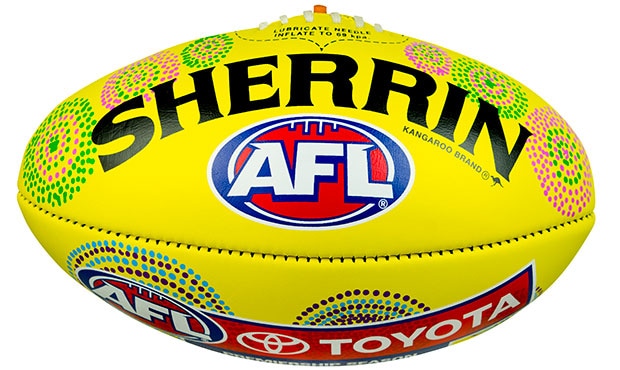Freo’s number one ticket holder and respected indigenous elder Richard Walley presented the 2017 indigenous jumper to the playing group on Tuesday morning.
Walley spoke to the players and coaches about what the jumper represented, but also touched on what the AFL's Indigenous Round meant to him.
He recalled a story from a time he was holidaying with a group of friends in Rome and a discussion started about Australia’s culture, and his Italian tour guide’s opinion of Australia having no culture.
“He started to get a bit cheeky with us, saying that we didn’t have any culture,” Walley recalled.
“We were at the Colosseum when the conversation started, so I asked him if he was a direct descendant of Caesar.
“He said no, so then I asked if he was a descendent of the gladiators and he wasn’t either. He wasn’t able to tell me if there were any descendants of Caesar still in Rome,”
Walley went on to say his tour guide then pointed out the historical buildings and ruins in Rome were centuries old and that is where the Italian culture comes from.
“I said with a smile to him, ‘well, I’m a descendant of the people who pre-date Caesar and I can speak my language better than you can speak Latin’,” Walley told the playing group.
“I told him in Australia we have a culture that’s living, you have buildings and explanations of people who are no longer here. We still have those people living,” Walley said.
As Walley continued his conversation with the tour guide he noticed the other Australian’s in his group started joining in.
“All of a sudden they were talking about our culture, and talking about Aboriginal people as Australia’s people as a collective rather than Aboriginal and non-Aboriginal,” Walley said
“When we are talking about the Aboriginal culture, it may be Aboriginal and Nyoongar culture, but it’s Australia’s treasure, its our collective treasure.”
Walley touched on the past and noted that aside from being able to serve in the Australian Army, playing Australian Rules Football was one of only two way aboriginal Australian’s’ were treated as equals.
“It’s the only place where people stood side-by-side under the same laws,” Walley said.
“That’s why football is important to Aboriginal people, it’s the only place there was a level playing ground.
“It was the only place where people could stay and practice after 6pm when everyone else was barred from being in the towns in the 1970s.”
Walley finished his address to the players with a strong message to the entire playing group.
“When you are wearing the jumper you are not just wearing an Aboriginal jumper you are wearing an Australian jumper that is ours as a collective,” Walley said.
“It represents all of us.”
Ross Lyon also touched on what Indigenous Round meant to him as a coach and how footy has been used as way to bring people together.
“We understand the challenges of the past and footy has been a vehicle to break down prejudices, and give opportunity and equality,” Lyon said.
“It continues to be that. It’s a wonderful round and we want to honour it with great effort.”
Sir Doug Nicholls Round: Fremantle Activations and Awareness Activities
Sorry Day Flower
Michael Walters and Ross Lyon wore the Sorry Day Flower in their media conferences during the week. All coaches and support staff will also wear the Sorry Day Flower on game day.
The Sorry Day Flower symbolises the Stolen Generations across Australia. It denotes compassion and spiritual healing, helping contribute to the collective healing process for Australians affected by the removal policy.

Ross Lyon wearing the Sorry Day flower in his media conference on Wednesday.
2017 Indigenous Jumper
Designed by Fremantle past player, and the first indigenous player to win the club's Doig Medal, Dale Kickett and number one ticket holder and Aboriginal artist Richard Walley.
Walley and Kickett presented the indigenous jumper to the playing group and football staff on Tuesday morning.
Meaning behind Indigenous Jumper
The playing group will train in the indigenous jumper in their final training session on Thursday morning ahead of Saturday’s game against the Adelaide Crows. Past indigenous players have been invited down to the training session to watch the action and catch up with current players.
Fremantle's 'moorditj' Indigenous history #foreverfreo pic.twitter.com/FnVp35muE9
— Fremantle Dockers (@freodockers) May 23, 2017
Game Day
A selection of players will wear the numbers 50 and 67 on their warm-up tops pre-game.
This year celebrates the 50th anniversary of the 1967 Referendum whereby the Australian public voted to include Aboriginal people in the census and to allow the Commonwealth government to make laws for Aboriginal people.
A Welcome to Country and Smoking Ceremony will take place pre-game with both teams remaining on ground to view the ceremony. In an AFL initiative, each match during Sir Doug Nicholls Indigenous Round will have the Aboriginal flag painted in the centre circle, the Torres Strait Islander flag painted on one of the 50 metre markings on each half of the field, and ‘67’ placed on the other 50 metre markings to commemorate the 1967 Referendum.
Indigenous players from both Fremantle and Adelaide will meet in the centre circle for the coin toss where players will exchange message sticks.
The Fremantle banner will include the Nyoongar word ‘Moorditj’ meaning strong.
Walters explains the meaning of 'Moorditj'
Sherrins designed by dual AFL Premiership player and Brownlow medallist Gavin Wanganeen, featuring a powerful design paying homage to every AFL club and celebrating the 50th anniversary of the 1967 referendum, will be used as the match ball for the game.

2017 Sir Doug Nicholls Indigenous Round ball Fremantle and Adelaide will play with on Saturday night.
ICEA – Yarn program
The club has partnered with ICEA to conduct an interactive session with all players, coaches and administration staff that explores invasion, colonisation, ethnocentricity and how the past impacts the future. This will take place at the Fremantle Dockers facilities at Cockburn ARC on Thursday afternoon.



